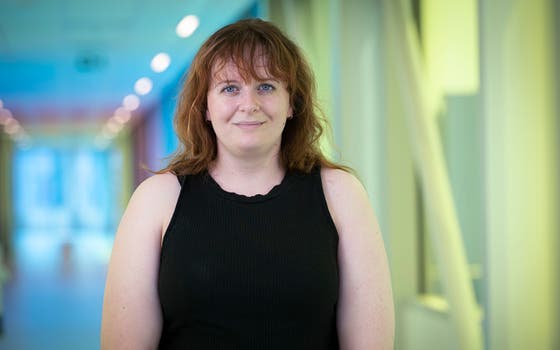The resilient baby brain

Femke Lammertink defended her PhD thesis on the role of stress on newborn babies' brain development. Supported by findings from her thesis, Femke argues for a new look at this brain development. "Instead of only looking at the negative effects, I would like to shine a spotlight on the resilience that these young babies naturally have."
Femke: "In preterm babies, the effects of early stress on (brain) development are often looked at unilaterally: stress has a negative effect and leads to reduced brain growth. Since a large proportion of preterm babies actually develop well, we were curious to know how early stressful events during Neonatal Intensive Care admission can lead to adaptive change in brain development. In this study, we highlight both sides of stress: the potential limiting effects and stress resilience, or adaptation, after preterm birth."
Resilience
When we talk about adaptive, we are talking about the adaptability of our brain. Femke: "The brain appears to be able to adapt itself to circumstances. This is a phenomenon we know from another context: the brain is able to create new connections due to a visually stimulating environment. The same can happen as a result of stress. The brain of preterm infants can adapt in such a way that they become more stress-resistant. We also call that resilience."
Early maturity
Thus, they found that stress caused certain brain networks to mature faster in premature babies compared to babies born at term. They also saw differences in behaviour between these babies. Femke says: "We think that because babies in neonatology are exposed to stress and an unfavourable environment, the brain has to make a trade-off, so to speak. It then prefers the development of specific brain connections over another. These changes are a 'healthy' response to an extremely stressful environment. We just don't know at the moment whether these changes are beneficial beyond the 2nd year of life."
Femke: "We need to move towards a different way of looking at this change: a reconceptualization." Instead of looking at the deficits a baby has, look at the high level of adaptation. Femke: "Those adaptations a baby apparently needs in order to cope as well as possible. That is a beautiful trait that is often approached negatively because people look more at limitations rather than adaptation."
Large-scale networks
Femke conducted her research with professor of neonatology Manon Benders and in collaboration with Christiaan Vinkers (Amsterdam UMC), Martijn van den Heuvel (Amsterdam UMC) and Erno Hermans (Donders Institute). As such, Femke combines different areas of expertise in her research: from computational - using mathematical models - network science to clinical neuroscience. Femke: "My dissertation was really made possible by these collaborations, as the brain is incredibly complex."
Femke explains, "Many of the connections in the brain form early in life." That's why Femke looked at large-scale brain networks in this study. "We looked both at interconnected nerve cells, and at the pathways and intersections in the brain at the time they are still under construction."
Future
Femke: "Right now, we don't know what makes certain children more resilient than others." To find out, more research needs to be done. Femke hopes to continue her research into better understanding adaptation after early stress.
Still, Femke wants to give parents of premature infants a heads-up. "The fact that the child was born prematurely is very scary. But a large proportion of those children are able to develop well, despite a difficult start. A baby's brain is incredibly resilient."
